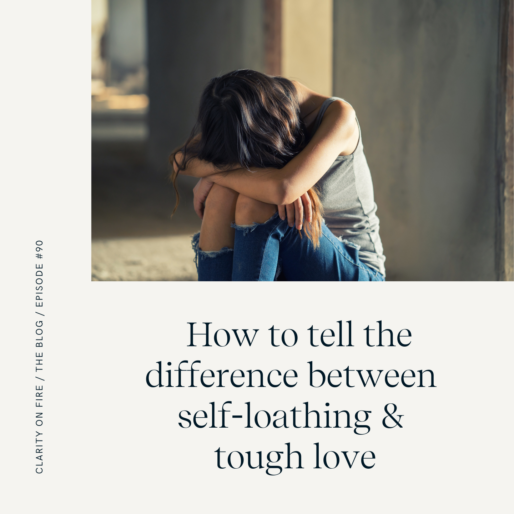Click the play button below, or subscribe and listen through our podcast on iTunes, Stitcher, or Google Play.
Podcast: Play in new window | Download
I once knew somebody who was excellent at deluding herself.
Her M.O. was to spend many thousands of dollars every year (money she certainly didn’t have) on courses and personal development programs and fancy wellness retreats in Europe.
What was pretty genius was that it was easy to justify pulling out the credit card for these things because, on the surface, they all looked like really positive, empowering, self-loving investments. But she often came back without much to show for her investment, and she’d quickly jump into the nextpricey course or event.
So … is that the most loving thing she could have done for herself? I’m obviously skeptical.
I could make the case that a better route would have been not to dig herself deeper into debt year by year in an attempt to find self-love and self-acceptance.
Maybe the tougher, but more compassionate, approach would have been to take a good hard look at how she was spending her money, and find a more cost-effective and less glamorous way of caring for herself. (A good therapist would likely have been covered by her insurance, after all.)
In an ironic way, creating big financial problems for herself through “self-care” experiences was an unconscious form of self-loathing. I think she believed that if she’d forced herself to stay home or not invest in the 10th course that year, that would somehow equate to not loving herself.
You can see how sticky this is, which is why I wanted to dive into it. Because self-loathing isn’t always overtly mean, and tough love doesn’t always look warm and fuzzy. They can masquerade as each other.
So, for those of you who know all too well what it feels like to beat yourself up (and don’t want to keep doing that), BUT who also don’t want to delude yourself or let yourself off the hook, I’m diving into how to parse the difference between self-loathing and tough love in this week’s brand-new blog.
SELF-LOATHING IS A NASTY B
Most of you likely don’t need me to demonstrate what self-loathing sounds like, but still, let’s be really clear. Self-loathing is:
- Usually unnecessarily mean and nasty: If you would be horrified to speak to a friend the way you speak to yourself (“You’re worthless. No one likes you. You’ll never amount to anything.”), then you can guarantee it’s self-loathing.
- About your IDENTITY as a person: If you screwed up, the message sounds like, “You ARE a screw-up!” If you’re having a hard time understanding something it’s, “You ARE an idiot!”
- Motivated by SHAME: There’s nothing whatsoever uplifting about self-loathing. It tries to make you change your behavior through shame or fear. And if you don’t succeed in changing something, it layers on moreshame about that.
- Often comes at the expense of your own future: If you’re burying your head in the sand and denying reality, you may get to indulge some temporary whims, but you create more and bigger problems down the road.
- Inherently void of self-respect: It’s ALWAYS about how you’re not good enough, smart enough, or capable enough in some form or another. You never get to win or look good or be acceptable.
The flavor of self-loathing is one of resentment, shame, and denial. It’s an attack on your very worthiness and value as a human being, and it NEVER makes you feel more motivated or happy.
If self-loathing were a person, she’d probably be Miranda Priestly (from The Devil Wears Prada), Dolores Umbridge (from Harry Potter), or Sadness (the downtrodden blue lady from Inside Out).
TOUGH LOVE IS LIKE A STERN-BUT-LOVING GRANDMA
For some reason, I’m imagining Judge Judy as the incarnation of tough love. This broad does not have time for your bullshit. And she’s determined to find a fair outcome that’s just for everyone. (I haven’t actually watched Judge Judy in years, but I LOVED it as a kid.)
I so wish my grandma hadn’t passed away when I was 15; I would have loved getting to have conversations with her as an adult. But she also totally embodied that energy of, “I love you, and BECAUSE I love you, I am not going to tolerate this nonsense.”
To me, tough love is:
- Honest and can sometimes sting, but isn’t nasty: It’s your grandma (or Judge Judy, if you prefer!) saying, “Yeah, you messed up. And you need to own up to that. But that doesn’t change how I feel about you.”
- NEVER about your identity as a person, but rather about your ACTIONS: If you screwed up, that doesn’t make you a screw-up. It means you’re a worthy, smart person who failed. It doesn’t define you from here on out.
- Motivated by seeing the best in you and wanting to nurture that: It’s not about wanting to make you feel terrible so you’ll change; it’s wanting to empower you to change because you have so much potential. It’s inspiring, even in its toughness.
- Never about spiting your future in favor of your present: It’s going to ask you to do hard things in the here-and-now so that you can have a future where you feel free and fulfilled.
- About directness and respect: Tough love forces you to look at things that feel uncomfortable and face reality so that you can move through it. If you refuse to admit something to yourself, how can you grow and heal? It’s about respecting yourself enough to do the necessary hard work for your own betterment.
In my mind, when tough love is spoken aloud it may be hard to hear, but it’s never an attack on your core character or value as a person. Here’s a fun experiment:
If you spoke the self-loathing in a sweet voice (the way you’d talk to a baby or puppy), would it sound good, or demented? “You are SUCH a piece of crap! Who’s a terrible person?! YOU are!”
And filtered through that same tone, I think tough love would register even more clearly as empathy and compassion: “I know you can do better next time. You’re still a good person.”
DON’T GET IT TWISTED
Retreat Lady (as I’m now dubbing her) was practicing the “burying her head in the sand” variety of self-loathing.
My best guess is that she didn’t trust in her ability to handle her money situation. Maybe she felt incompetent or not smart enough, and instead of sitting down and taking a good hard look at her finances, she kept running away from the mounting problem (and therefore adding MORE problems to the pile).
She was looking for a quick fix, hoping that something in one of those courses or retreats would enable her the ability to magic her problems away.
And the funny thing is, I bet there were nuggets of wisdom among all the things she invested in that applied to her situation and could have helped her sort it out. But nothing could overcome her unwillingness to sit down with the problem and stare it directly in the face.
So, may we all channel our inner tough-broad grandmas (Judge Judy very much included). May we drop the shame and guilt and, instead, pull up our big girl (or guy) pants and do the necessary hard work for our own betterment. Not because we don’t like ourselves, but because we really, really DO.
What about you? I’d love to hear if this helped you discern the difference between self-loathing and tough love. And I’m very game to hear your personal fan-casting of both! 😉 Come share with me in the comments below.
Much Love,
Rachel (& Kristen)
TIRED OF BEATING YOURSELF UP?
It’s super sad to admit, but undoubtedly true that EVERYONE has some form of self-loathing. Seriously. If you think you’re alone in your feelings, it’s only because other people have been keeping quiet about their own insecurities.
But just because it’s normal doesn’t mean it’s necessary. The whole point of coaching is to help set you free of this type of crippling fear so that you can get clear on who you are and go after what you really want. And if you couldn’t tell already, we’re pretty excellent at tough love.
If that sounds like exactly what you need, then we should chat about 1-on-1 coaching!
Fill out the quick form on this page and we’ll talk it out.


